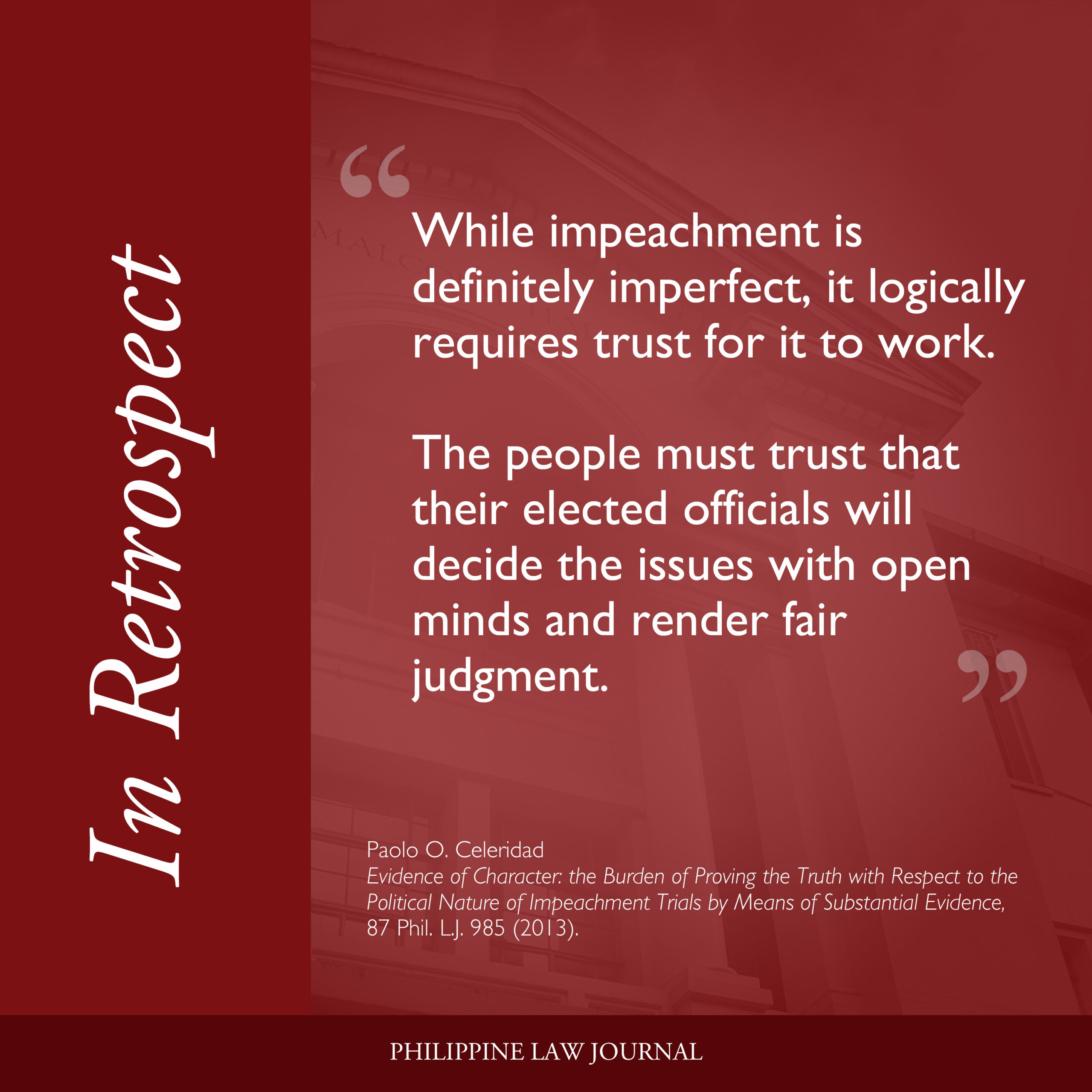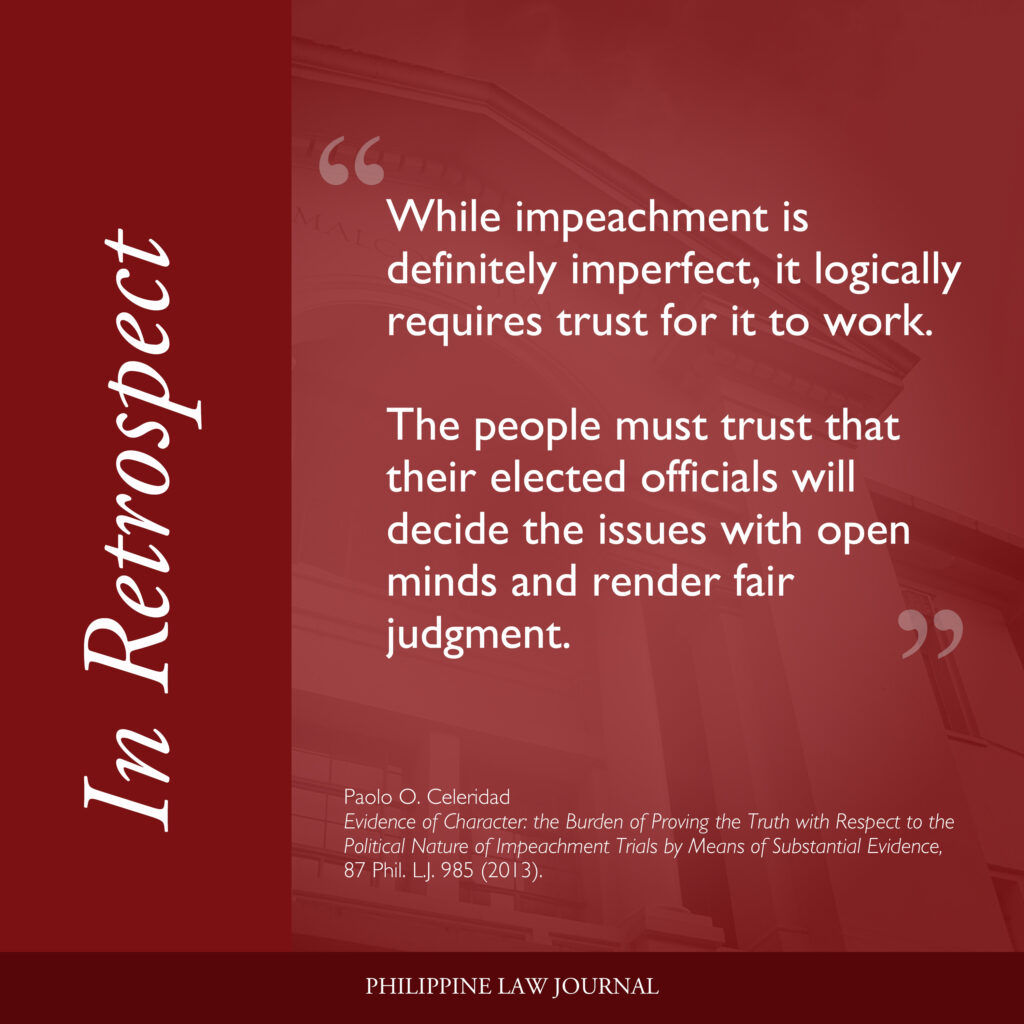Philosophical Perspectives on Impeachment

For some of the highest-ranking officials in the country, there is no concept quite as loaded as impeachment—“a proceeding exercised by the legislative, as representatives of the sovereign, to vindicate the breach of the trust reposed by the people in the hands of the public officer by determining the public officer’s fitness to stay in the office.”[1] It is a constitutional process outlined in Sections 2 and 3, Article XI of the Constitution, which ultimately results in a judgment of removal from office and disqualification—making it both a powerful instrument of accountability and a menacing political weapon.
The recent impeachment of Vice-President Sara Duterte by the House of Representatives has brought the complexities of the impeachment process back into the public eye. In this special edition of In Retrospect, we highlight legal scholarship published in the Journal that dissect the intricacies, effects, and legal gaps of impeachment.
Paolo Celeridad’s Evidence of Character: the Burden of Proving the Truth with Respect to the Political Nature Impeachment Trials by Means of Substantial Evidence,[2] came at the heels of the 2011 impeachment and subsequent removal of Former Chief Justice Renato Corona. The work discusses the major issues the Senate must consider when acting as an impeachment court. Celeridad argues that the Senate must “strike a balance between protecting the interests of an allegedly injured public with the right of an allegedly untrustworthy public officer to remain in office.”[3] To counter the “amorphous” character of impeachment proceedings and the lack of a clear standard of evidence in convicting the accused public officer, Celeridad proposes impeachment trials to be understood as a normative, self-checking political process. Any potential abuse of factionalism in impeachment proceedings are corrected by their nature as an open and closely watched public trial, which compels the Senate to decide towards greater civic virtues or societal needs.[4]

Other pieces published in the Journal have openly critiqued the provisions that govern impeachment and how they have been interpreted. One such provision, the one-year bar rule—which prevents impeachment proceedings from being initiated more than once in a year[5]—was heavily scrutinized in The “Impeachment Epidemic”: Defeating the One-Year Bar Rule.[6] Here, Marie Catherine S. Alcantara argues that the one-year bar, despite being designed to strengthen accountability and minimize political harassment, has been ineffective in achieving either purpose.
As outlined by Alcantara, cases such as Francisco v. House of Representatives[7] and Gutierrez v. House Committee on Justice[8] have demonstrated precisely why the one-year bar fails to achieve its purposes. In both cases, the Supreme Court held that the rule is reckoned from the point that impeachment proceedings are initiated. However, as Alcantara argues, such an interpretation would allow erring public officers to benefit from the initiation of frivolous impeachment cases getting in the way of legitimate impeachment proceedings.
Thus, Alcantara argues that the term “initiation” should refer to the transmittal of the Articles of Impeachment by the House of Representatives to the Senate. She believes that transmittal better reflects the purpose of the one-year bar, as not only does it prevent frivolous suits from triggering the rule, but it also considers how it is only upon transmittal that the Senate’s legislative work is disrupted.[9]
Finally, in Distorting the Rule of Law: the Committee on Justice and the 2005 Impeachment Proceedings, Roman Miguel G. de Jesus explores the concept of “rule of law”—a frequent theme in the discourse surrounding the Arroyo impeachment complaints in 2005.[10] As noted by de Jesus, the “rule of law” was a refrain weaponized to the point of banality by all political sides, regardless of their support for or dissent against the Arroyo impeachment complaints. However, he argues in the Article that the “rule of law” is not a buzzword flippantly thrown around but a legal term entailing a clear theoretical framework with three distinct definitions—the rule of law over men, the law of rules, and the law of right, with the first two definitions being interrelated.
The first is rule of law as the “rule of law over men” or the principle that laws are meant to restrain the state and bind state actors. Conversely, there is the “law of rules,” which is the framework that laws must be clearly defined, predictable, and equally applicable. These two definitions are mutually reinforcing concepts,[11] but sticking exclusively to them may lead to political actors washing their hands of responsibility during impeachment complaints simply by invoking “the rule of law.”
De Jesus argues that the House Committee on Justice did exactly this in deliberating on and junking the impeachment complaints against President Arroyo. He believes that the impeachment proceedings could have been decided differently had the Committee considered a third, crucial definition of the rule of law: the rule of law as the rule of right, which answers the question of what is “right” as opposed to what is lawful. The rule of right must be the “north star” by which the first two conceptions of the rule of law must be guided. A failure to take these three theoretical frameworks collectively into account is where the Committee failed during the Arroyo impeachment proceedings.
It is clear from the perspectives offered by these works that impeachment, while a definite political and constitutional process, is also a highly complex and philosophical matter with a labyrinth of issues yet to be traversed by legal scholars. With the pending impeachment trial of Vice President Duterte, and regardless of its outcome, there will inevitably be a new set of questions for pondering by legal scholars, members of Congress, and the general public, which holds the highest stake in protecting their public trust in public office.
* This In Retrospect was prepared by Editor Andrew Daniel Holandez Mencias and Vice Chair Iñaqui Angelo Mangahas (Philippine Law Journal, Vol. 98), with the assistance of Interns Jethro Camara and Chloe Wu.
In Retrospect is a series of thought pieces revisiting past Journal articles in light of recent developments in current affairs or related literature.
[1] Republic v. Sereno, G.R. No. 237428, 863 SCRA 1, 193 (2018).
[2] Paolo Celeridad, Evidence of Character: The Burden of Proving the Truth with Respect to the Political Nature of Impeachment Trials by Means of Substantial Evidence, 87 Phil. L.J. 985 (2013).
[3] Id. at 986.
[4] Id. at 1026–28.
[5] Const. art. XI § 3(5).
[6] Marie Catherine S. Alcantara, The “Impeachment Epidemic”: Defeating the One-Year Bar Rule, 91 Phil. L.J. 241 (2018).
[7] G.R No. 160261, 425 SCRA 44, Nov. 10, 2003.
[8] G.R. No. 193459, 643 SCRA 198, Feb. 15. 2011.
[9] Id. at 287.
[10] Roman Miguel G. De Jesus, Distorting the Rule of Law: The Committee on Justice and the 2005 Impeachment Proceedings, 80 Phil. L.J. 236 (2005).
[11] Id. at 271.